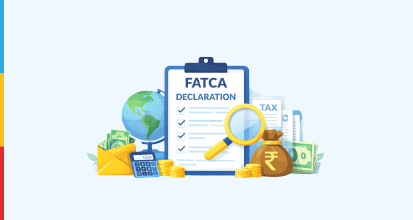Written by : Knowledge Centre Team
2026-01-05
1166 Views
7 minutes read
Share
Taxes can be complicated. That is exactly why your investment and saving strategy should account for how the returns will be taxed upon maturity/exit. Under the Income Tax Act, 1961, your various investments are eligible for tax deduction under 80C. In order to build a substantial corpus of funds as you proceed on your professional and consequently financial journey is possible only if you are very watchful of where your money goes. In this article, we show you how you can benefit from tax deduction under 80C of the Income Tax Act, 1961.
The Larger Picture:
Under the Income Tax Act of 1961, Section 80C states deduction provisions on various investment options that can generate returns for the taxpayer and are also eligible to claim deductions while calculating the total taxable income of the taxpayer. Section 80C allows individuals and HUFs to claim tax deduction of up to ₹1,50,000 for certain tax-saving investments and payments.
Depending on the slab that you fall under, you can save a substantial amount of money by making use of provisions for tax deduction through investment in the instruments specified under Section 80C. Tax deductions are a sure-shot way for individuals to reduce their tax burden. When it comes to saving tax, most individuals prefer to claim tax deduction on the savings in the investment instruments specified under Section 80C, among other options.
| Investment options | Minimum lock-in period |
| Equity Linked Saving Scheme (ELSS) | 3 years |
| National Pension Scheme (NPS) | Till Retirement (60 years) |
| Senior Citizens Savings Scheme (SCSS) | 5 years |
| Public Provident Fund (PPF) | 15 years |
| National Savings Certificate (NSC) | 5 years |
| Unit-Linked Insurance Plan (ULIP) | 5 years |
| Fixed deposit (FD) | 5 years |
| Sukanya Samriddhi Yojana (SSY) | 8 years |
So how is it done? Before getting there, let us look at how some of the components of expenditure and investments are treated under Section 80C.
Life Insurance:
If you are paying life insurance premiums that cover you, your spouse or your kids, then those payments will be eligible for a tax deduction under Section 80C. However, there is one condition: if the policy was issued after Mar 31, 2012, then the amount paid towards premiums should be less than 10% of the amount received on maturity. For policies issued before this date, the payments made toward premiums are eligible for tax deduction if their value is less than 20% of the amount received on maturity.
If you are repaying the principal amount on your home loan for a property that is not under construction, then that amount of money will be eligible for deduction under Section 80C. However, if the property is transferred within five years from the date of possession, then the taxpayer will not be eligible for these benefits.
In fact, if the property is transferred within five years, then the benefits claimed on the amount in previous years become taxable in the year of transfer. Another point to note: the amount paid towards stamp duty and registration of the property at the time of purchase will also be eligible for tax deduction under Section 80C of the Income Tax Act.
Contributions of up to ₹1.5 lakh made towards the Public Provident Fund are eligible for income tax deductions under Section 80C. However, you should know that these funds have a lock-in period of 15 years, so you can figure that into your savings strategy. The same goes for the Equity Linked Savings Scheme. However, their mandatory lock-in period is 3 years. In case of Bank FDs, the principal amount is eligible for tax deductions under Section 80C, while the interest is not. This condition holds only for FDs that mature after 5 years.
| Sub-sections | Tax Deduction | Eligible Investments |
|---|---|---|
| Section 80CCC | ₹1,50,000 | Payment made towards Pension Plans and Mutual Funds |
| Section 80CCD(1) | ₹1,50,000 | Payment made towards certain Government schemes such as National Pension Scheme, Atal Pension Yojana, among others |
| Section 80CCD(1B) | ₹50,000 | Investments of up to ₹50,000 in the National Pension System (NPS) are considered for exemption under this section. |
| Section 80CCF | ₹20,000 | Investments made toward long-term government-approved infrastructure bonds. |
Section 80CCG | Up to 10 % of salary (basic + DA) for private-sector employees and up to 14 % for Central Government employees | Employer’s contribution to NPS (this deduction is over and above the overall ₹1,50,000 limit |
The ITR-1 contains a detailed break-up column where deductions applicable under various sections of the Income Tax Act can be listed. These deductions are claimed in Part C of the third tab of ‘Computation of Income and Tax’. If you are filing ITR-1 online, then some of these details get auto-populated from the details provided in Form 24Q, which is filled by your employer. Taxes can complicate your saving and investment strategy. Apply for it today and start saving taxes on your investments.
Under section 80C of the Income Tax Act, you can claim a maximum deduction of up to ₹ 1.5 Lakh from your total income.
No, as per Section 80C, taxpayers can avail a maximum tax deduction of ₹1,50,000, which shall include all the investments made in tax-saving instruments.
Yes, life insurance policies bought from any IRDAI recognised insurer, be it public or private, are eligible for deduction under Section 80C.
No, donations made to specific institutions are not eligible for tax deduction under this section of the Income Tax Act; instead, they are eligible under Section 80G.
Yes, you can claim a deduction under Section 80C while filing your income tax return.
Disclaimer - This article is issued in the general public interest and meant for general information purposes only. The views expressed in this blog are solely those of the writer and do not necessarily reflect the official policy or position of Canara HSBC Life Insurance Company Limited or any affiliated entity. We make no representations or warranties of any kind, express or implied, about the completeness, accuracy, reliability, suitability, or availability with respect to the blog or the information, products, services, or related graphics contained in the blog for any purpose. Any reliance you place on such information is therefore strictly at your own risk. You should consult with a qualified professional regarding your specific circumstances before taking any action based on the content provided herein.





We bring you a collection of popular Canara HSBC life insurance plans. Forget the dusty brochures and endless offline visits! Dive into the features of our top-selling online insurance plans and buy the one that meets your goals and requirements. You and your wallet will be thankful in the future as we brighten up your financial future with these plans.